I’m a White Girl from Whittier and I’m #GoingThere
{{site_text.blog author}} | August 18, 2014

I was raised in a city that is 65% Hispanic.
So, I’m kind of good, right?
I don’t have a problem with race.
I honestly don’t think much about it.
So, I’m kind of in the clear, yes?
Or maybe not so much.
I am who I am, I am where I am because of God’s design for my life.
But have I ever purposed to seek out something other?
Honestly? No.
Maybe not even once.
And this, I am awakening to, is part of the problem.
My part in the problem.
. . . . .
Every voice has value. That’s kind of the point.
But what if not saying something is wrong?
Growing up, my family hosted a slew of international students. I heard hushed tones of
Japanese whispers sneaking out from the downstairs bedroom and boisterous bursts of
Argentinian laughter booming from the corner room upstairs. College students from
Taiwan and China, Finland, France, and Spain gathered around our dining room table to
share food and culture and conversation.
Later we rented a spare room to an older woman from Sri Lanka. I remember liking her
coffee colored skin but having a harder time with the pungent smelling leftovers she left
uncovered in the fridge.
In high school I dated a Vietnamese guy whose parents weren’t too keen on
the fact that I was white.
There was a black girl on my basketball team and apricot was not the most common
colored skin in our school.
Through the years my mom dated several men of color and my dad’s second wife was
Korean. I celebrated a half dozen Christmases with my three Asian American step-siblings
and never minded my step-mom’s special kimchi refrigerator.
I have one niece and five nephews on two sides of my family who are half
Mexican and beautiful.
I adore my boys’ pediatrician who is from somewhere in the Middle East. His thick accent
and foreign inflection have become comforting indicators of expertise and care.
I live in Southern California, one of the most ethnically diverse regions in the
entire country.
So, I’m kind of good, right?
I’ve rubbed shoulders and shared meals with people who don’t share my pale complexion. I’m
used to hearing different languages spoken in Target and the nail salon.
I don’t have a problem with race.
I honestly don’t think much about it.
So, I’m kind of in the clear, yes?
Or maybe not so much.
Maybe some people I care about, some voices I respect, are starting to speak up, speak out to
say that the status quo of quasi-diversity isn’t “all good” after all. Maybe there’s a whole lot
about how God designed, how God desires the Church and Christian community to look like
that people like me are completely missing.
Should I feel badly that I’m a thirty-something white female living in an upper-middle class
neighborhood in a predominately white pocket of LA? No.
I am who I am, I am where I am because of God’s design for my life.
But have I ever stopped to consider that the design that looks similar to mine — the same
one I primarily sit next to at church and play with at the park and read online and listen to
at conferences — is not the only one God made? That white is not the only hue, form, voice
God cares about? Not the only story, perspective, experience I can learn from, be blessed
by, or call mentor, friend, pastor, or teacher?
Of course not, I say. Surely not all the roles I respect, people I cherish in my life have to be
white.
But have I ever purposed to seek out something other?
Have I ever intentioned to pursue someone unlike me for the purpose of discovering
the unique value they would bring?
Have I ever considered inviting a person with another color skin into my life for the goal
of delighting in who they are and how their perspective might be rich and beautiful,
necessary and crucial because of our differences?
Honestly? No.
Maybe not even once.
And this, I am awakening to, is part of the problem.
My part in the problem.
. . . . .
I scribbled down these mind whirrings, heart stirrings in my journal last week, days before
the news of Michael Brown’s tragic death and #Ferguson made its way into my tiny life bubble.
I poured out these honest reflections rooted in deep questions after having the privilege of
hearing a perspective from someone who feels “other,” from someone who I viewed as “in” but
opened my eyes to how horribly skewed “being in” may be.
I feel wildly inadequate to enter into this conversation. I fear that I have nothing noteworthy
to share, nothing of value to add. But as I listen to others chiming in to this #GoingThere
conversation, I realize that every voice is important.
Every voice has value. That’s kind of the point.
As a white woman who doesn’t have a “problem” with race, I worry that I’ll make things
worse or sound stupid or say the wrong thing.
But what if not saying something is wrong?
What if you don’t have to be a race-relations scholar or diversity expert to offer a
thoughtful contribution?
What if you don’t have to be an outright racist or full-blown bigot to be a source of
contention?
What if not having all the answers or understanding all the facts or being able to own
all the wrong aren’t good enough excuses to keep quiet?
What if just saying that I’ve
been wrong, that I’ve
excluded or discounted the
rainbow of God’s people, is a right place to start?
What if better actions need to trump good intentions?
He didn’t say I have to be qualified to open my hands and reach out.
So here I am.
Hands open and outreaching.
__________________________
Related Links:
Simple Things by Deidra Riggs
On Coming Together by Alia Joy
I’m a White Girl from Rural Iowa…and I’m ‘Going There’ by Jennifer Dukes Lee
I’m a white girl from the South African suburbs and I’m “going there” by Lisa-Jo Baker
With the heated debates and warring words exploding on social media right now, I feel
even further disqualified to add my tiny white-girl-from-Whittier two cents.
But God never said I had to be qualified to be obedient. He didn’t say I have to be qualified
to love, to speak up, to bend low, to say I’m sorry, let’s do better.
He didn’t say I have to be qualified to open my hands and reach out.
So here I am.
Hands open and outreaching.
__________________________
Related Links:
Simple Things by Deidra Riggs
On Coming Together by Alia Joy
I’m a White Girl from Rural Iowa…and I’m ‘Going There’ by Jennifer Dukes Lee
I’m a white girl from the South African suburbs and I’m “going there” by Lisa-Jo Baker
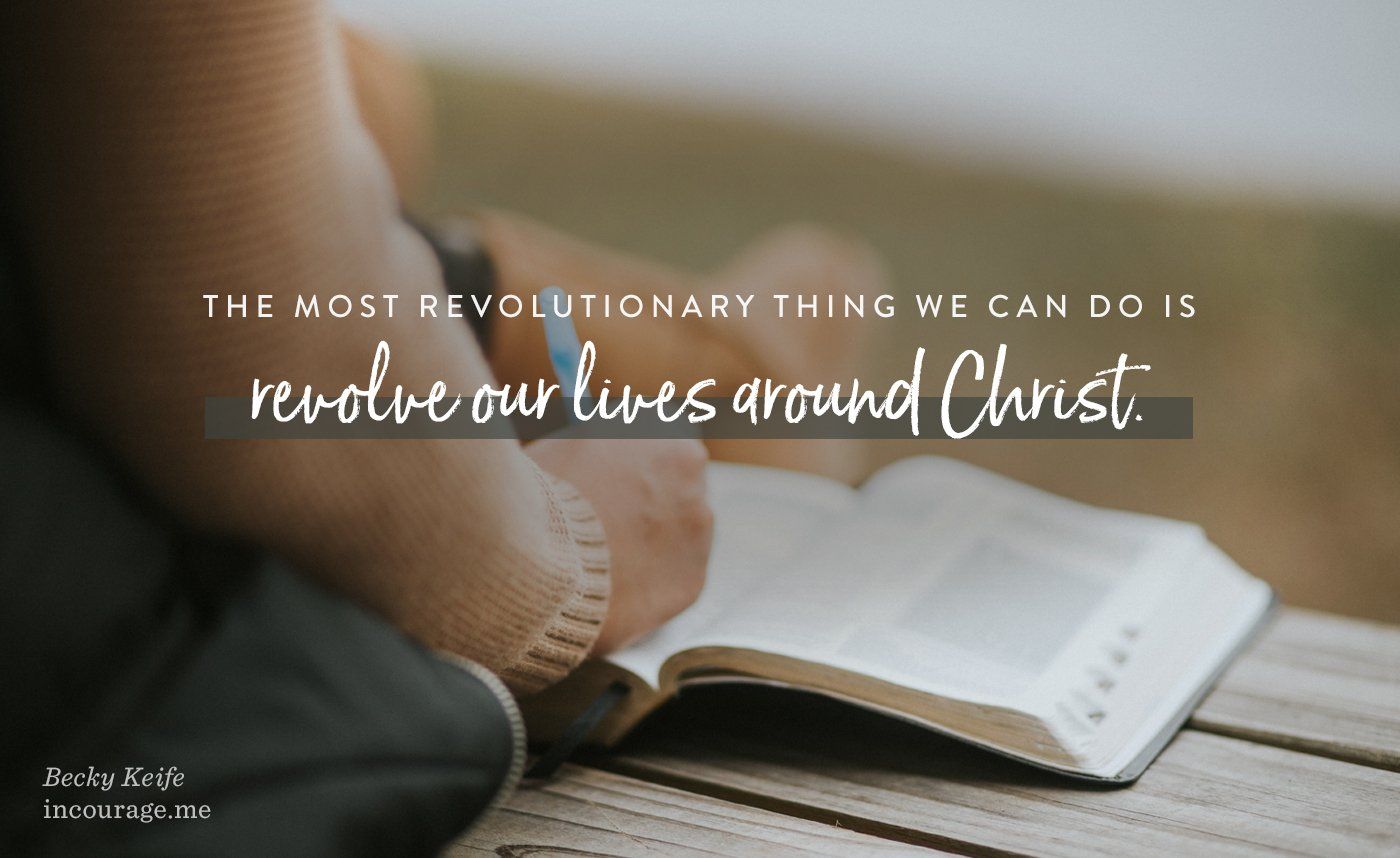
My friend Joy and I stood at the Starbucks counter deliberating our orders. We were tired from traveling, but didn’t want too much caffeine late in the afternoon. I finally piped up with my order. “May I have a grande blonde cinnamon dolce latte with almond milk, half-caf, half-pumps, and no foam, please?” Joy side-eyed me with a smile. Yes, I’m that girl. Specific. Particular. We were on a work trip together (actually our entire (in)courage staff was there!), so over the next couple of days, Joy, along with Anna and Grace, got to see my special ordering skills in all their glory as we enjoyed several more coffee shop trips and ate meals together. “Why yes, I’d like the carnitas meal, please, with pinto beans instead of refried, no sour cream, no pico de gallo, avocado slices instead of guacamole, a side of limes, and half corn, half flour tortillas. Thanks so much!” Some people might call me picky (or ridiculous), but I say I’m just a girl who knows what I want! Yet it occurred to me recently that despite my strong food and drink preferences (Diet Coke, LOTS of ice, lemon slice, with a straw), there are lots of times in life where I’m paralyzed with indecision. The world is like a giant Starbucks menu with so many options it can be overwhelming to feel like we have to choose the right custom combination of fill-in-the-blank to suit our exact wants or needs. What will fill me up and fuel me on in just the right way? Do you hear this looming question at every turn too? I hear the constant whisper on social media. I can even feel this way about Christian resources. (Is that okay for me to admit as part of a Christian resource company? Welp, I just did.) Friends, I find myself weary and thirsty for meaning, significance, answers, and truth. There are so many good (and plenty of not-so-good) offerings to choose from, but every promise of deeper understanding and fresh hope can end up sounding like noise. And the thing I’m wrestling with — and I’m wondering if maybe you are too — is this: When surrounded by so much noise, am I forgetting to listen to God’s voice? Every day I get notifications about new planners, journals, Bible studies, IG stories, blog posts, podcasts, YouTube videos, books, devotionals, conferences, and rappers preaching revival. ALL these things are good! Yet I can get so caught up in trying to identify the newest thing that could be the most revolutionary for me ( Have you tried a pumpkin cream cold brew? ) that I forget I already know what I really need and where to find it. What I really need is Jesus, and I can always find Him in the Bible. God’s Word should be my first, foremost. End of special ordering. End of story. I feel like this is a safe enough place to admit that God’s Word, Bread of Life, Living Water, is not always what I reach for. God has given us the power to choose. In modern day America especially, we’ve taken that freedom to the limit – and I’m totally a part of it. While I love the opportunity to custom order my Starbucks latte and Chipotle burrito bowl, I need to quit taking this “what am I in the mood for” mentality into my spirituality. We need to stop special ordering Christianity. The most revolutionary thing for me and for you is to revolve our lives around Christ. Let’s orbit our thoughts around Him. Let’s order our steps toward His. Let’s make the most special thing about us that we specialize in the language and love of Jesus. As believers, we ought to first be followers of Jesus before consumers of content. Without a doubt, I believe content creators should create! As a writer, I’ll keep writing. Artists should keep painting. Musicians should keep composing and performing. May each daughter and son of the King use their gifts to the glory of God! But if your soul is parched and your heart is weary like mine, we don’t need to keep scanning the Christian menu of radio stations and bestseller lists to find what best fits our current whim or wish list. Let’s feast first on Jesus. He always satisfies. He always satisfies. Then Jesus declared, “I am the bread of life. Whoever comes to me will never go hungry, and whoever believes in me will never be thirsty.” John 6:35 (NIV) This post first appeared on (in)courage.
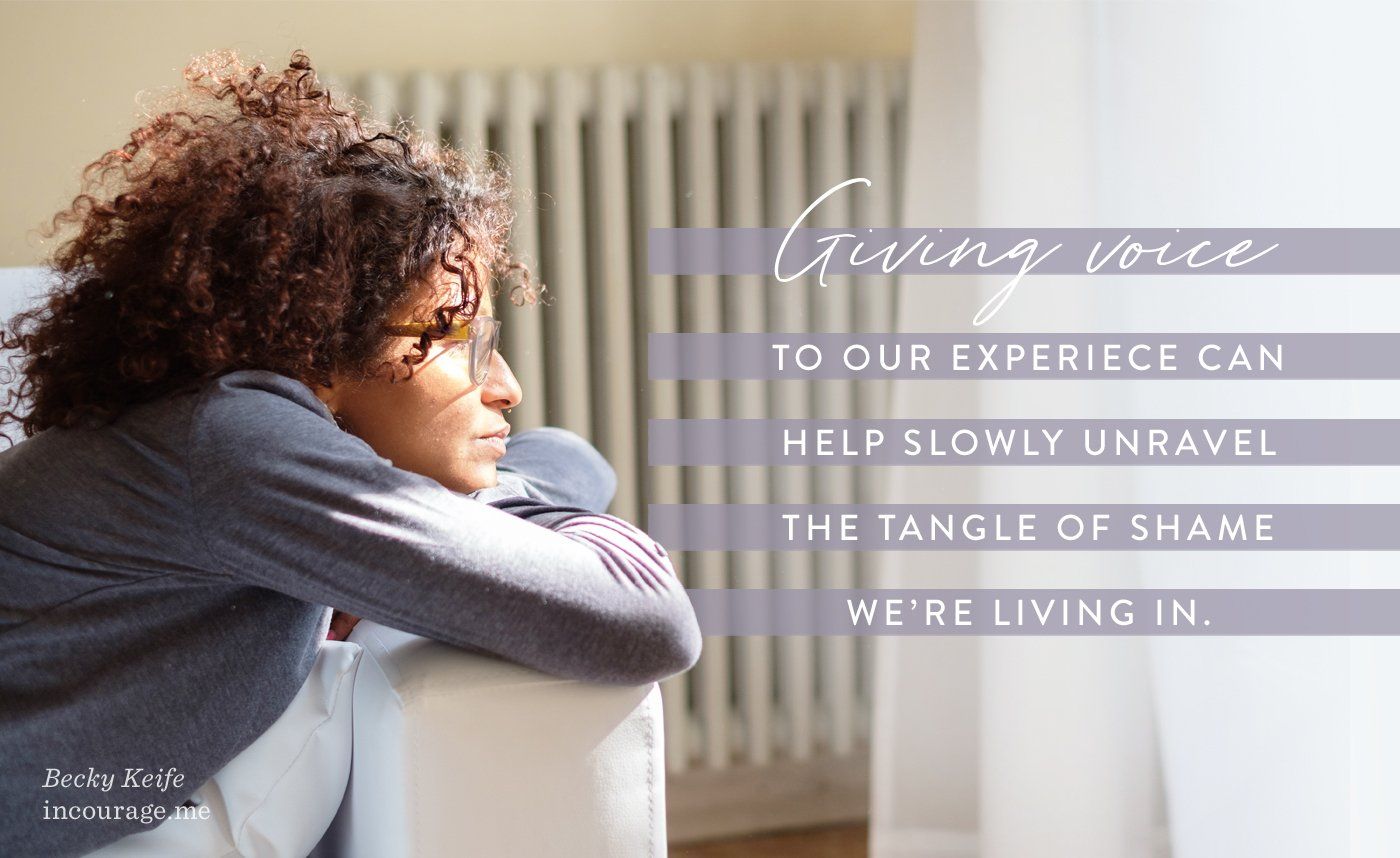
It was an ordinary Tuesday, except for the fact that I was on the verge of a breakdown over lemon zest. This sounds ridiculous, and it is, but it is also serious. This is the face of anxiety. I sat at my desk, nestled under the far windows in my kitchen, and plugged away at a long list of work tasks — emails to write, spreadsheets to analyze, projects to dream up. My list was long but it’s work I love to do, and I was grateful the kids were in school and I had a quiet morning to dive in. But on this particular morning, it turned out I wasn’t home alone like I expected. My husband was also there. His job demands long hours and lots of travel at times, which other days affords him the flexibility to set his own schedule and work from home. Super great, except on that day – for me. Chris came into the kitchen and started tinkering, opening cupboards, pressing buttons on the stove. I winced a little and looked up from my computer. “Whatcha doing?” I asked “Making those lemon bars,” he said. It was barely nine a.m., but he was preparing for the evening when we’d both enjoy having a sweet treat compatible with the limited eating plan we were on at the time. I tried to get back in my work zone. I reread the half-written email I was in the middle of composing. Glass bakeware clinked together as Chris pulled them from the cupboard. I leaned closer to my computer screen and typed the next sentence. Parchment paper ripped across the jagged metal line, ripping my concentration. I tabbed over instead to an article I needed to read. Deep breath. Chris carefully lined the glass dish with the waxy paper. Every crinkle sent a shockwave of irritation up my spine. I closed my laptop. I got up and started emptying the dishwasher. “Why are you doing that right now?” my husband asked over his shoulder. “Oh, you know. It’s just easier for me to concentrate when it’s quiet, so I figured I’d get the dishes done while you’re baking.” “Ok, can you hand me the grater?” I stacked bright plastic kid cups and placed spoons and forks in their designated slots in the silverware drawer. Deep breath. Deep breath. Eggs shells cracked. The metal whisk bounced and scratched inside the metal mixing bowl. Whisk, whisk, whisk. Over and over and over. I tried to fill my heavy lungs with enough breath. “Wash these lemons for me, will you please?” he asked. My heart raced. I washed the lemons. Then he started to zest. When my anxiety is high, there are some sounds I can tune out: the dishwasher humming behind me, the dryer thud-thrumming behind the thin laundry room door beside me. But other noises are like nails on a chalkboard to my tender wiring. Every time the lemon scraped the length of the metal grater, my insides cringed in pain. My chest tightened. This is stupid, I told myself. Get a grip. But I could not get a grip. I was unraveling. I stopped drying the dishes, but I could not stop the stream of tears. “What’s wrong?” my husband asked, bewildered. I shrugged my shoulders. “I don’t know. You’re not doing anything wrong,” I said. “The noise is just too much for me right now. I guess I’m having a flare-up of anxiety.” I walked through the hall into our bedroom, into our bathroom, shut the door, closed the toilet seat, sat down, and cried. I cried hard. I couldn’t not cry hard. There wasn’t one thing I was upset about. There wasn’t something I was stewing over or especially worried about. This was the most frustrating, shameful thing about anxiety to me — that I couldn’t always name it or explain it. And if I couldn’t explain why I was feeling what I was feeling, then it seemed invalid to feel it. I heaved air into my tight lungs and prayed for a way to help my husband and myself understand my world of anxiety in which we were both foreign travelers. My breathing slowed, and my mind filled with a new image. I walked back into the kitchen. “I want to help us both understand why I’m reacting this way, and I have an idea. Have you ever had a really bad toothache?” I began. “When a tooth nerve is damaged or exposed, things that you normally eat are suddenly extremely painful. Warm things become scalding and cool things become freezing and crunchy things become rock-hard; it’s impossible to eat normally.” I went on, “Food isn’t the real problem. The way you’re chewing isn’t the problem. There is a raw nerve that when touched produces a visceral, physical reaction you can’t control. This is what anxiety is like. Baking lemon bars is not the issue. My desire to cope with the noise is not the issue. My anxiety is like raw nerve endings and certain noises touch those raw nerves and trigger pain to the point that my system is overwhelmed. My body deals with it through tears.” I’m not sure if that made things any clearer to my husband, but I know it helped give voice to my experience. Giving voice to our experience can help slowly unravel the tangle of shame we’re living in. Friend, anxiety is real. Whether you relate with my experience or not, chances are high that there is someone in your life who does. We all need to understand that anxiety is more than a list of worries and woes that need to be prayed over or surrendered to the Lord. For sure we need to pray, and may we all live surrendered to Jesus! But we’ve got to understand that anxiety is not always synonymous with fear-driven worry. Anxiety can also be a mental health disorder caused by psychological and physiological imbalances with a host of symptoms. We don’t try to downplay a nerve issue when we’ve got a tooth screaming in pain. We don’t criticize ourselves when our iron levels are out of whack or we need more B12. We acknowledge the deficiency. We take steps to feel better. We seek help. Five months later and I’m doing better. I’m thankful for lemon zest and the things that force me to cry out to God. I’m thankful for His mercy in helping me understand my brokenness. I’m thankful for the grace that my anxiety has ebbed for now. And I’m thankful that when it flows again, I will be more ready to admit it and be gentle with myself. Let us then with confidence draw near to the throne of grace, that we may receive mercy and find grace to help in time of need. Hebrews 4:16 (ESV)
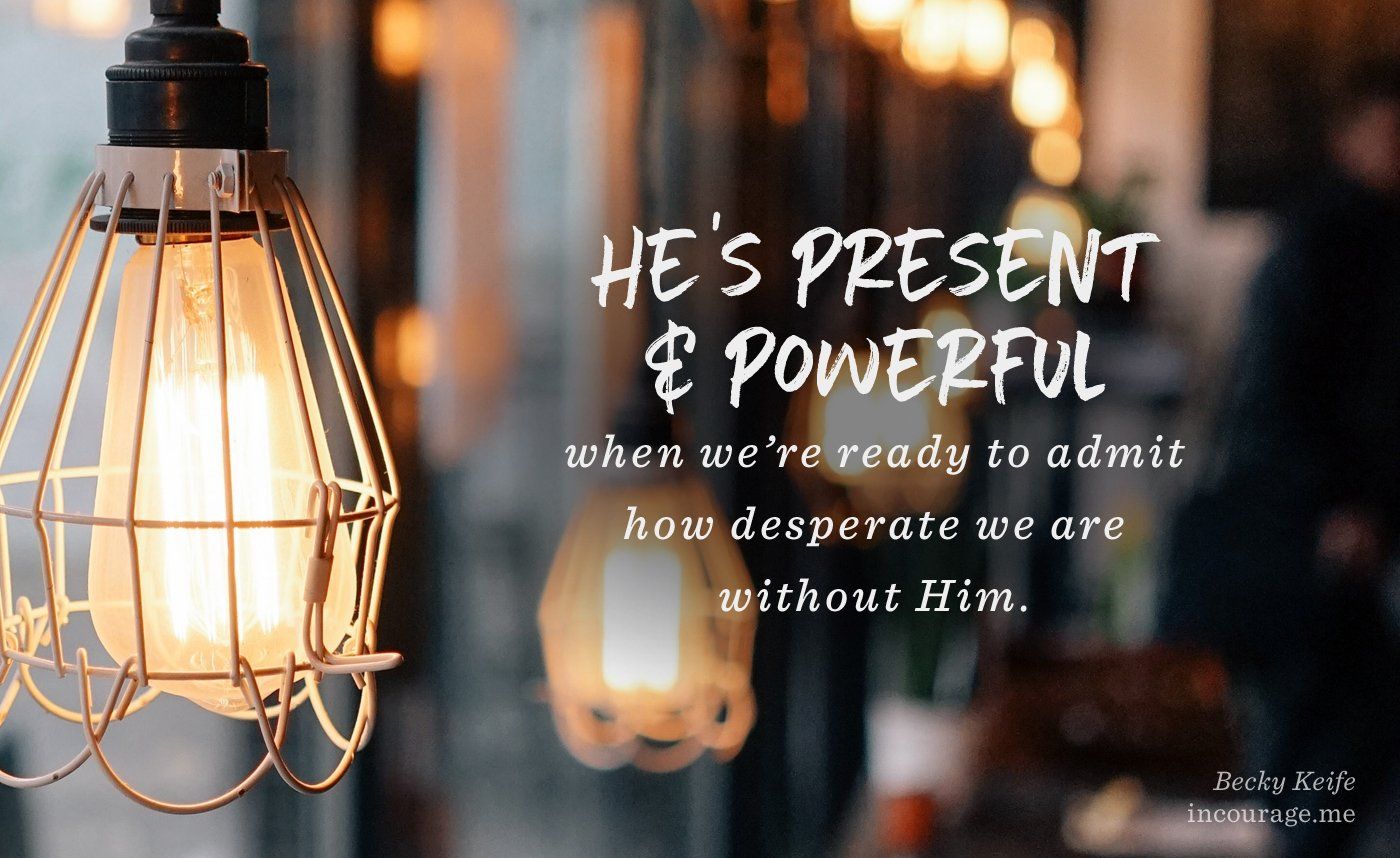
There’s this question I’ve been chewing on. I can’t get it out of my mind. It goes like this: What if the display of God’s power in our lives is directly related to acknowledging our need for Him? I’ve seen the evidence play out more times than I can count. For almost a decade I’ve watched a friend desperately try to grow her family. Every avenue explored, every expense exhausted. A child briefly placed in her arms only to be taken. So much heartache. An ongoing surrender to God’s goodness in the shape of suffering and sorrow. Last week she welcomed a child into their forever family. Only God. Another friend was recently faced with a weighty decision, one without a clear answer and lasting implications no matter which outcome won out. She couldn’t reason through it on her own. In her wrestling, God put an image in her mind, a person she needed to connect with. Yet she didn’t know this woman. Not knowing this at all, I felt compelled to connect my friend who was wrestling with another friend who had walked a similar road. Can you guess? The woman my friend needed to talk to was the one I introduced her to. Only God. Then there was a couple who sat on our living room couch late at night and asked if they could tell us their story. My husband and I leaned in. I couldn’t have guessed the brand of struggle, sin, and despair their marriage went through – nor could I have imagined the story of hope, healing, and redemption they’re living. “As long as you’re breathing, there is hope,” they said. We weren’t personally in crisis, but I knew these words were true beyond seasons of despair. I tucked them in my heart. Hope in hopeless situations — only with God. Not one of these friends would have chosen their circumstances or written their own story, but in their greatest need, they experienced God’s great power. That is a gift not one of them would trade. I wish I could reach through this screen and know the unexpected, undesirable, hanging-on-to-hope circumstances you’re living. We’ve all got something. But in my lack of knowing, God knows. He sees you. He is with you. I’m wondering if He’s prompting all of us to ask: What if the display of God’s power in my life is directly related to acknowledging my need for Him?
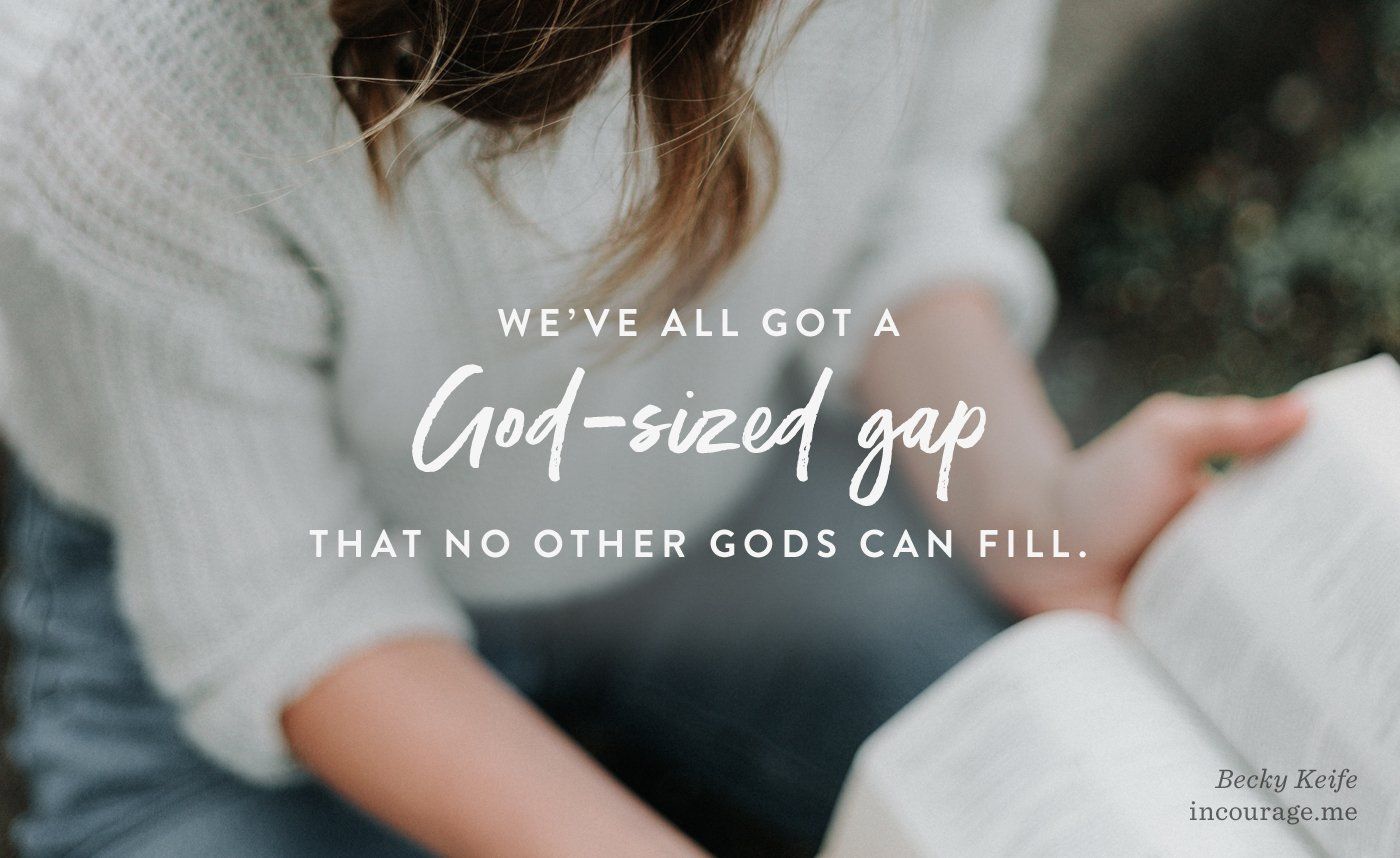
I’ve been feeling it again. That low-grade ache of discontentment. That inner restlessness, nagging, gnawing, something softly knocking. That unnamed longing for something more even on the good days when I finally catch my breath, catch up on laundry, or make it to bedtime without being called a mean, mean mommy. I don’t know why it takes me so long to recognize the source — God’s still small voice, calling yet again to return to Him, spend time with Him. I’ve been choosing the trap of glowing screens and too many late-night scrolling minutes. Whoa, where did the last hour go? I like to be alone. Alone with my thoughts. Alone in my digital bubble, an insulated reprieve from all the demands and needs. I like to be alone, yet I tether myself to the noise of hundreds of friends I don’t know beyond a screen. Cute cat! Sad story. Look who’s pregnant or moving or getting a promotion! The evidence of my choice to indulge in digital vegging shows up the next morning in dark under eye circles and two more snooze cycles. It’s a chore to drag myself awake. I’m too tired and distracted to hear God call: Come to me. Connect with me. Can you relate? Have been you been there? Are you there today? Now, it’s not like I don’t read my Bible. It’s not like I don’t pray. I’m good with God. We talk throughout the day. I’m okay. But what if doing enough to spiritually get by isn’t the point? I’m finally listening to my longing and admitting that there’s something in my lived-out priorities that’s outta whack. My soul hungers for more. And more social media, more sleep, more viral videos, more home organization, more activities or mindless TV aren’t going to cut it. You and I were made for more. We were cut out for divine connection. Created for intimacy. Hand-picked for relationship. Sculpted for surrender. Wired for worship. We’ve all got a God-sized gap that no other gods can fill. We’ve got to recognize the ways we’ve been trying to let them — and stop. Say no to what pulls us away from the Gap-Filler and instead press into Him. I set my alarm earlier than my comfort says to. I remind my kids about our no TV rule before school and to read in bed if they wake up early (Murphy’s Law says if I get up early, someone else will too!). Time protection in preparation: I decide what I’m going to read, place my journal and Bible on top of my laptop lest I autopilot-forget my purpose and fly right into work. Time protection in expectation. Before I drift off to sleep I remind myself of what is true: The law of the Lord is perfect, refreshing the soul. The statutes of the Lord are trustworthy, making wise the simple. Psalm 19:7 (NIV) In the morning, Lord, you hear my voice; in the morning I lay my requests before you and wait expectantly. Psalm 5:3 (NIV) Inviting God to fill the place in our lives only He’s made for isn’t a one-size-fits-all formula. There’s no right or wrong way to spend time with Jesus. But for me, I’ve found nothing better than to start my day with Him. In God’s Word. At Jesus’s feet. Pen to paper. Recording and remembering. Listening. He’s never not shown up to meet with me. The struggles of our lives, the crises, and daily grind are real. The urgent things that demand immediate doing, the desirous things that draw us to their company, the attention-grabbing things that feel in-the-moment important but lack eternal significance — I get it. I get all of it. But we don’t have to live consumed by the noise that is not His voice. Before the sun has yet to run its horizon-rising course, I will come. With gunk in my eyes and a stiff morning back, I will come. When I reach for my alarm, I remind myself that I’m not getting up for Facebook or Instagram or email. As I pull the chain on my stained glass desk lamp, flooding the darkness with light, I remind myself I’m not rising early for productivity, to check more off my list. I rise for Him. Those who know your name trust in you, for you, Lord, have never forsaken those who seek you. Psalm 9:10 (NIV)
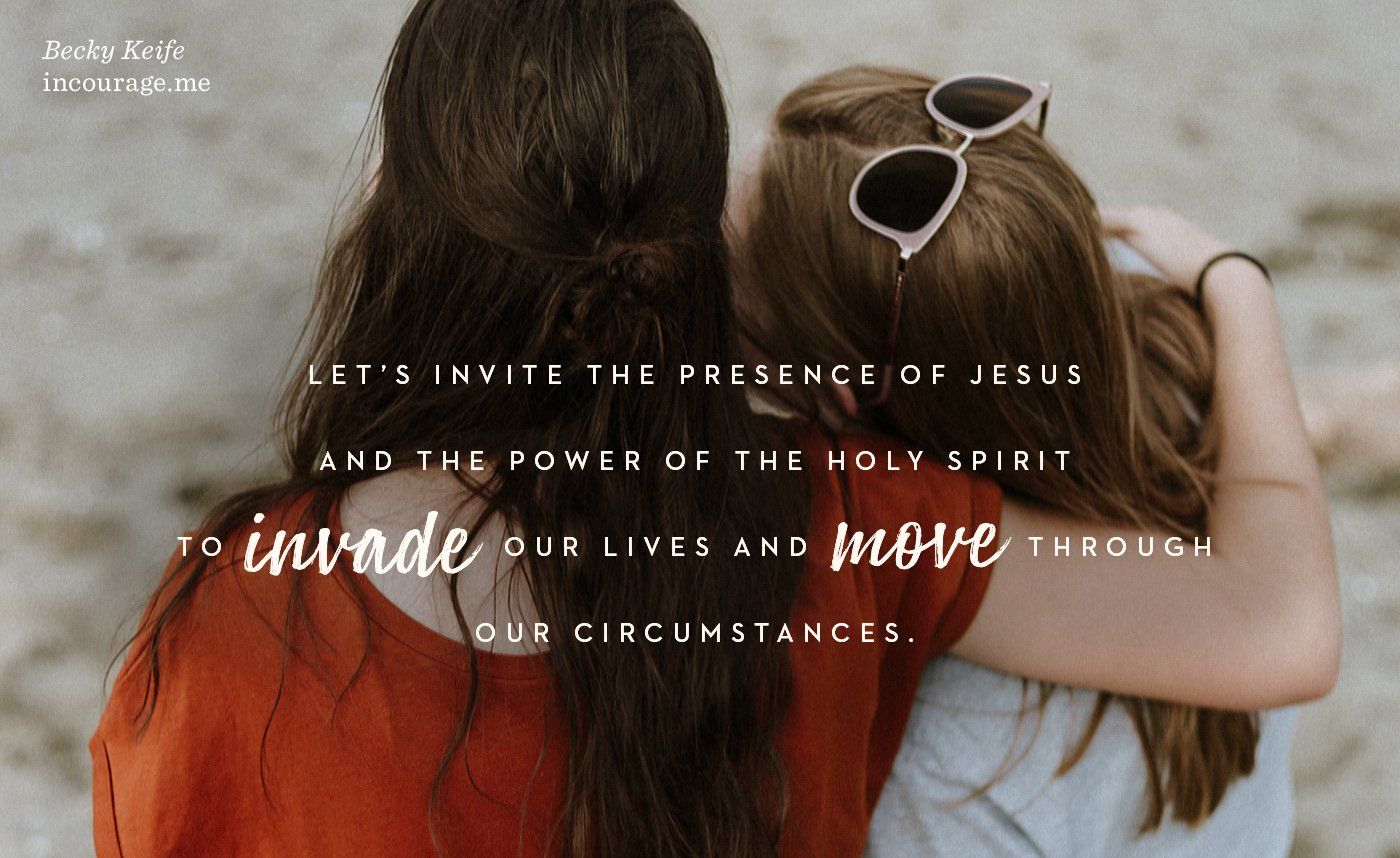
It startled me the first time it happened. It was a Wednesday night my freshman year of college at the musty-smelling YMCA behind my dorm where the collegiate ministry I was involved in met for weekly worship and teaching. We milled around afterward in small groups, scuffing our feet on the thin, dingy carpet, laughing easy, procrastinating going back to whatever late-night studying or paper-writing awaited us. I was talking with my friend Kathy. We were probably sharing the highs and lows of the week or commiserating over how the dining hall ran out of chicken crispitos at dinner. I don’t recall the exact details of our conversation — I’m sure it involved me spilling my latest stress-inducing situation with school or the guy I was dating, not dating, or wanting to date again. Through the fog of almost twenty years, I do remember clearly what happened next. “Let me pray for you about that,” Kathy said. And then she put her hand on my shoulder and started to pray. She didn’t say, “I will pray for you about that,” as in, after we leave or tomorrow before class or later in the week if I happen to remember. She just did it — right there under the buzzing fluorescent lights with our friends cracking jokes nearby and the worship band tearing down their equipment. Kathy prayed. Telling you this story now doesn’t seem so radical. My friend prayed for me. So what? But at the time? As an eighteen-year-old feeling fresh and stretched in my faith-growing skin, it was the most outrageous, exhilarating thing. I felt so . . . cared for. Seen. Kathy’s prayer didn’t last long. Standing there with my eyes closed in the middle of a bunch of a college students felt awkward. But maybe simple words and a healthy dose of awkwardness are the very things that can point another person to Jesus. It did for me. That wouldn’t be the last time a friend gave me the gift of praying in the moment. Just last week at church, I found my friend Margie during the “mingle” time between our singing and the pastor’s preaching. Immediately, her sweet face lit up, and she pulled me into the type of warm hug grandmas give best. Then she took my hand and asked how the book was coming. (The last time we spoke a few months ago I was in the middle of writing.) I told Margie that I had finished my manuscript and would be getting edits back soon, but I needed God to expand my capacity given an extra busy season at work. There in the middle of a cacophony of chit chat, with friends and strangers shaking hands across rows of chairs, Margie pulled me back in for a hug and prayed. “Lord, increase Becky’s time and energy this week. Use her talents for the good of Your kingdom and to encourage the hearts of women. You are so faithful. We know You will do it. Amen.” I inhaled my friend’s rose perfume and smiled at the life of faith etched across her face. An extra dose of joy and peace had transferred from her to me in our final squeeze. I felt held up. Margie could have promised to pray for me that week, and I know she would have been good to her word. But to stop and do it right there was a gift to my heart. Yes, God, You are faithful. Thank You for giving me friends to remind me how true it is. Something powerful happens when we choose to listen carefully and then enter into someone’s circumstances by taking their concerns straight to God. In moments like these, I know Jesus’ words to be true: For where two or three gather in my name, there am I with them. Matthew 18:20 (NIV) Let’s be a friend like Kathy, a friend like Margie. Let’s listen well and pray boldly. And it doesn’t just have to be in a church-like setting. When we run into a friend at the car wash or in the frozen food aisle or at school pick-up, let’s be women who risk feeling awkward for the sake of strengthening a friend’s faith. Let’s invite the presence of Jesus and the power of the Holy Spirit to invade our lives and move through our circumstances. I don’t know if it felt like an act of courage to Kathy to pray for her college peer. I don’t know if Margie thought she was being courageous by modeling intercession to a younger Christ-sister. But to me, they are women of courage, and the landscape of my faith is better because of them.
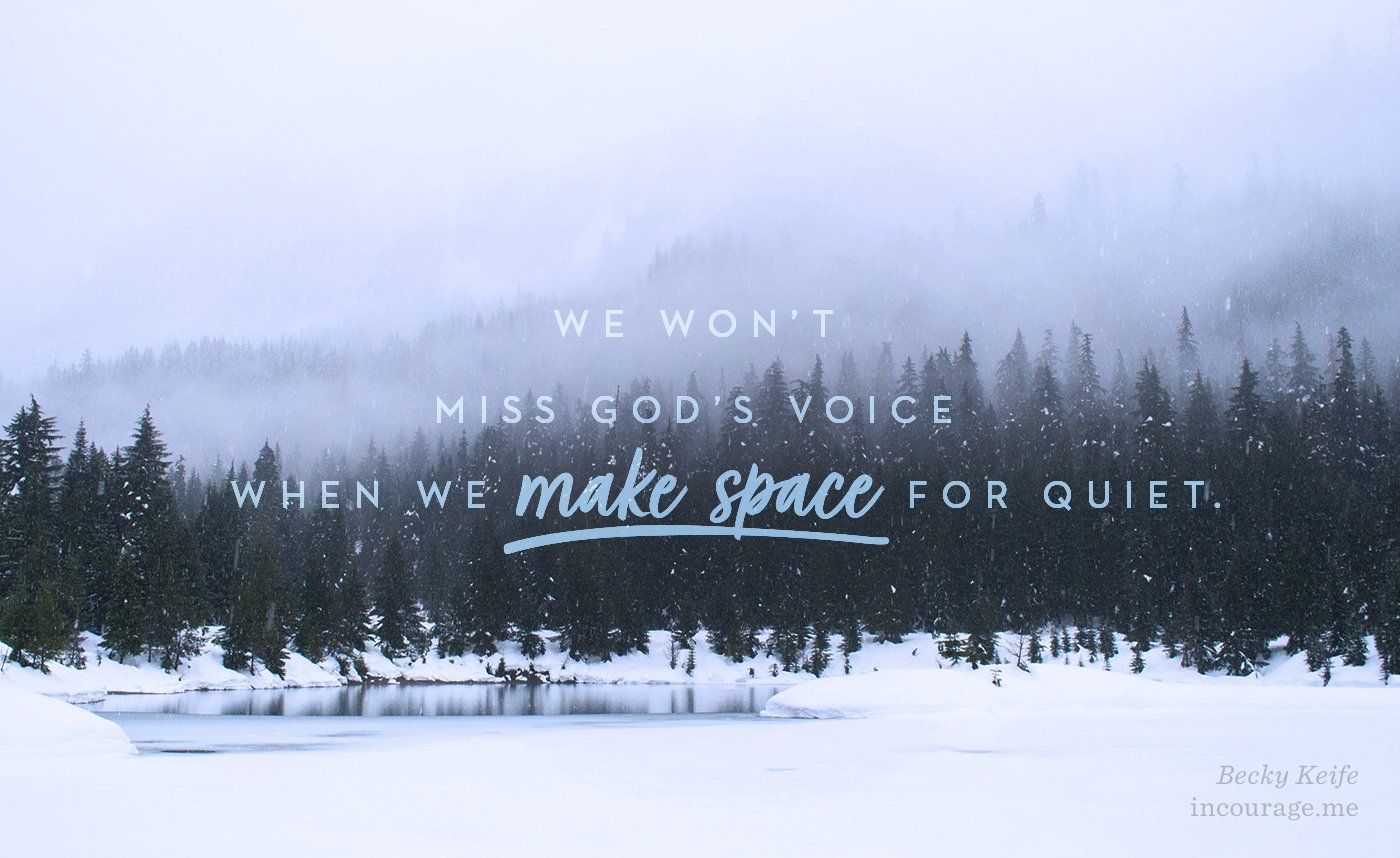
I’ve spent the last many weeks juggling Christmas parties and shopping lists, trying to remember which kid needs a $5 ornament and which one has to bring a traditional holiday dish for his class feast. In the midst of the holiday happiness and chaos, I’ve also been trying hard to listen — straining for the answer to the question my spirit is aching over: God, what are You saying? Help me to hear. I don’t want to miss it. I have a case of spiritual angst over hearing God’s voice. Not because I doubt His ability to speak to my heart, but because sometimes I question whether I’ll be able to hear Him above all the noise. Life is just so loud. I’m not talking about the constant clamor coming from my three growing boys. (Though the volume they produce is staggering.) I’m talking about the noise of constant information and solicitation. The amplification of confrontation. The perpetual bombardment of breaking news and viral videos. Divisive posts and explosive comment threads. So much fine print and endless must-see lists. My eyes are blurry and my ears are ringing — and it’s not from twinkling lights or jingle bells. None of it is particularly out of the ordinary. It’s become the white noise to our regular lives. But just because it’s normal doesn’t mean it’s spiritually palatable. I can’t stand radio commercials or TV commercials. They trigger immediate irritation. Just ask my husband. My senses also feel assaulted by huge billboards flanking the freeway and flashing neon signs groping for my attention. Pop-up ads and email spam, flyers tucked under my windshield wipers and stuffed in my front door handle. It’s all too much for me to handle. I wonder if I’m the only one who feels this way. Does everyone else know how to tune it all out? Or do they somehow embrace the nonstop petitioning for our attention, our purchase, our opinion? Do others just happily ride the current of hot trends and best deals without any soul nausea from feeling jostled inside? Anyone else exhausted by it all? It’s not that I have anything against the blowout sale at Macy’s or the new Chinese restaurant with the coupons for free wontons. I’m sure I’d enjoy reading all the magazines and subscribing to all the podcasts and you bet I’d look better, feel better if I said yes to every workout plan and supplement and oil promoted on Facebook. Business and commerce and blog posts aren’t bad. But if I had one wish this Christmas, it might be for those noise-canceling headphones that I envy every time I’m on an airplane. Yet the noise entering my ears isn’t as much the issue as the noise clamoring in my soul. Noise demands to be heard. It’s territorial. It crowds out whatever else is trying to take up space. I think this is why I’m aching for quiet this Christmas. I want to tune out, push back anything that isn’t Jesus. I want to make room for Him not only on the day we celebrate His birth but every day. Join me over at (in)courage today for four practical ways to quiet the noise this Christmas and into the new year. It’s what I’m #preachingtomyownheart. I pray it encourages your heart too. Merry Christmas.
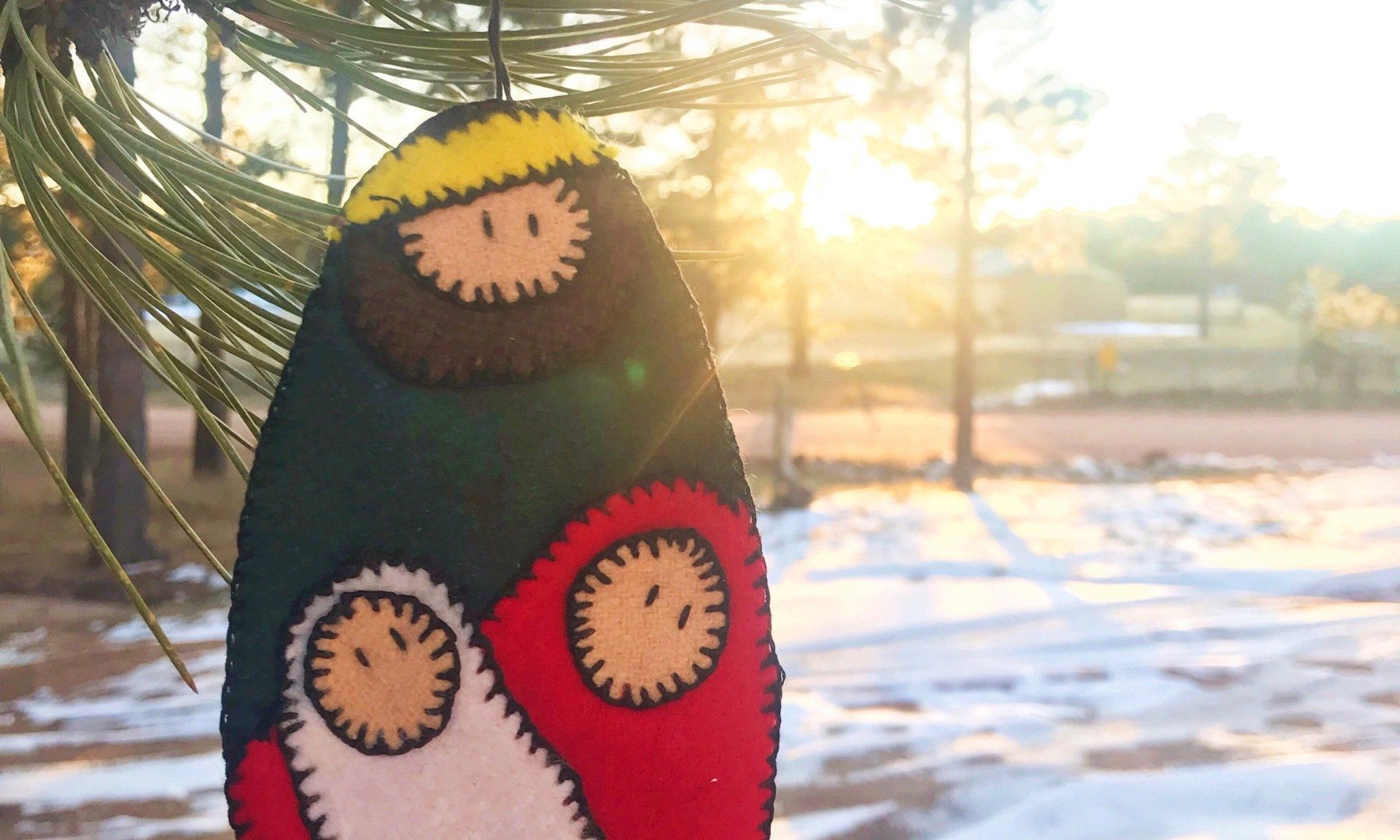
I remember as a little girl being bright-eyed with wonder at the candlelight service on Christmas Eve. The dark sanctuary filled with families and neighbors and sweater-clad strangers standing shoulder to shoulder — waiting. A single flame started in one corner. A tiny flicker in the dim expanse. Then the glowing wick from one candle would touch the waxy tip of the next and the flame would pass. At the same time, the soothing melody of Silent Night rose from one voice. The crowd joined in. Silent night, holy night. All is calm, all is bright. I waited anxiously, twirling the white candle between my palms. I loved being part of transforming the darkness, of passing on the source of warmth. One by one, each person dipped their lit candlestick forward to bring light to the next person. The flames quickly multiplied as one became two, and two became four, and four became eight until all five hundred worshipers were reached. I look back through my mind’s eye and see my six-year-old freckled face aglow with Christmas awe. Thirty years later and that scene still gets me. How we, the body of Christ, the church, have the joy and privilege of gathering in celebration of the greatest gift ever given because of Christ’s body — the Son of God turned human infant, born to live and die in love and sacrifice. Yet our purpose as believers is not only to gather but to respond, to help spread the Light. For the past two weeks, the (in)courage community has been linking arms with Mercy House Global to spread God’s mercy and light in tangible ways to women in poverty. Today is the last day of our #1000mercies campaign and I wanted to invite you to be part of it! Join me over at (in)courage to read the rest of this story and find out how you can give the gift of hope this Christmas.
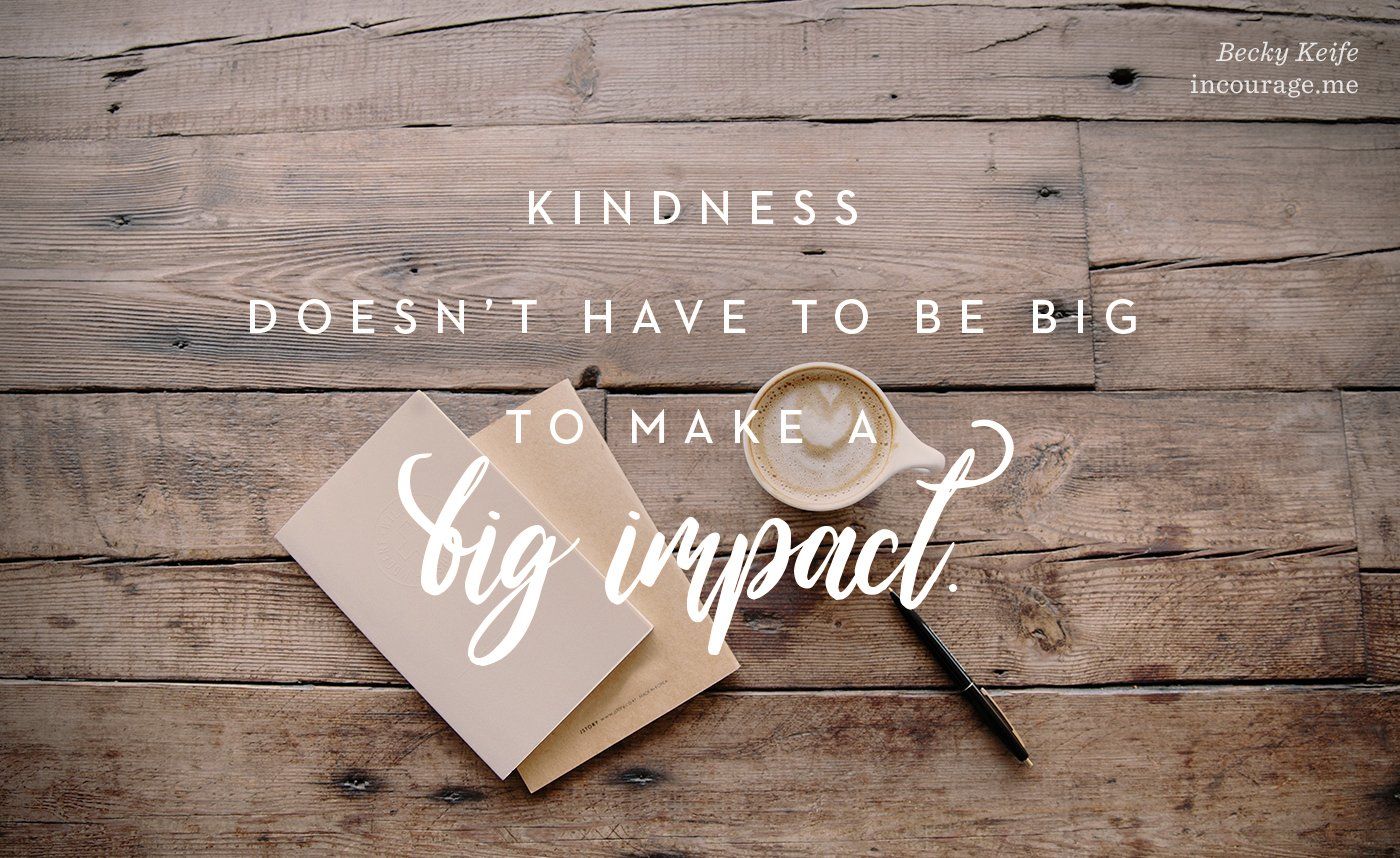
The receptionist with the sparkly blue eyes smiled wide when I came up to the counter to make my follow-up appointment. When several of the next available visits didn’t work with my schedule, I sighed in frustration and offered a weak apology. But she wasn’t irritated or impatient. “Let’s keep looking to find something that will work for you,” she said. I felt cared for. The baby was strapped to me in the Bjorn, one toddler was in the top of the shopping cart, and the other one squirmed in the basket with groceries piled around him. All three boys were humming at a low, nerve-grating whine, and I was spying the oatmeal on the top grocery store shelf, calculating if it was worth the climb. “You’ve got your hands full. Let me grab that for you,” said the gentleman with a scruffy beard and long reach who magically appeared. I felt seen . I walked into the large sanctuary where women were chatting in small clusters. I scanned the room looking for the cardstock sign with my assigned table number and made a beeline for it. Squeezing past a group of women, someone touched my shoulder from behind. “Hey, Becky!” I turned, surprised that anyone there knew my name. “I’m so glad you joined us again!” the ministry coordinator said. I felt valued. These snapshots of intentional kindness only lasted but a moment, but years later, they are still vibrant in my memory. Why? They weren’t lavish or extravagant. They weren’t loud or flashy or done for an audience. They were simple and small. Kindness doesn’t have to be big to make a big impact. That’s why I love the new Care Dare from DaySpring — they’re making it easy to be intentional about kindness. When I signed up, I got a printable download with over thirty simple ways to show people in my everyday life that I care. Easy things like, Say Hello First, Send a Card, Give a Compliment, and Thank Someone in Ministry. For the next thirty days, I’m going to join thousands of people in showing others I care. You should join me! Think of the big impact we could make. Chances are high that those who showed me small kindness in the past wouldn’t even recall the moment. But I remember. In a busy world where people are often preoccupied with their own rushing wants, urgent agendas, and frenzied schedules, an act of compassion stands out. I’m sharing more about the biblical call to kindness and a practical way we can put Scripture into practice. Join me over at (in)courage to read the rest of the article.

Big pines stood tall around me bearing witness to the smile stretched across my face. The campground was alive with morning noises — bacon sizzling on outdoor skillets, kids laughing louder than they would at home. I watched a bright blue chested bird perch on a branch heavy with pinecones while two hummingbirds zipped around in a magic dance. I sipped slow on my steamy coffee. Everything is better in the mountains. This was my family’s favorite week – when we (mostly) unplug, enjoy nature, and soak up lots of time just being together. It was the perfect way to end summer — connecting and refreshing before my husband begins his busiest season of the year as a college volleyball coach and our three boys start back to school and all the activity and responsibility that brings. With fresh air in my lungs and no alarm to wake me up (save for the loud whispers of excited kids), it was easy to start each day with gratitude in my heart. I thanked God for crackling campfires, family corn hole tournaments, and sunny trails just waiting for the happy thud of hiking boots. Thank You, God, for seeing our need for a break from ordinary routine. One afternoon I sat on a huge log at the far end of our campsite. My husband was on a jog, and the boys were building an epic fort. In the stillness of the moment — no one needing me, no task demanding to be done — I answered the still small voice. Pour it all out to Me. So I began to pray. For my husband and for each of our boys. For friends by name as they came to mind. I prayed for the young women my husband coaches and their upcoming season. For my book writing and other projects in the making. For you, our beloved (in)courage readers, for each contributor, and my staff-mates. For all that God has done and will yet do. I talk to God every day. But it’s often in the whirl of fixing meals or the rush of driving here and there. It had honestly been a while since I just sat with Jesus without some pressing next. Given the space to think, feel, share all that was on my heart, I found myself overflowing with thanks. For every request I had, my praise was doubled. Not because I’m extra pious or righteous but because of God’s profound goodness. With the sun on my back and the gift of time, I was flooded with awareness for all the ways God had answered so many prayers. So I was a little surprised by what the Spirit whispered to my heart next: Give thanks for the gifts you didn’t ask for . Praise Me for answers you never prayed. Join me over at (in)courage for the rest of this story and the simple prayer that can change the way we see.
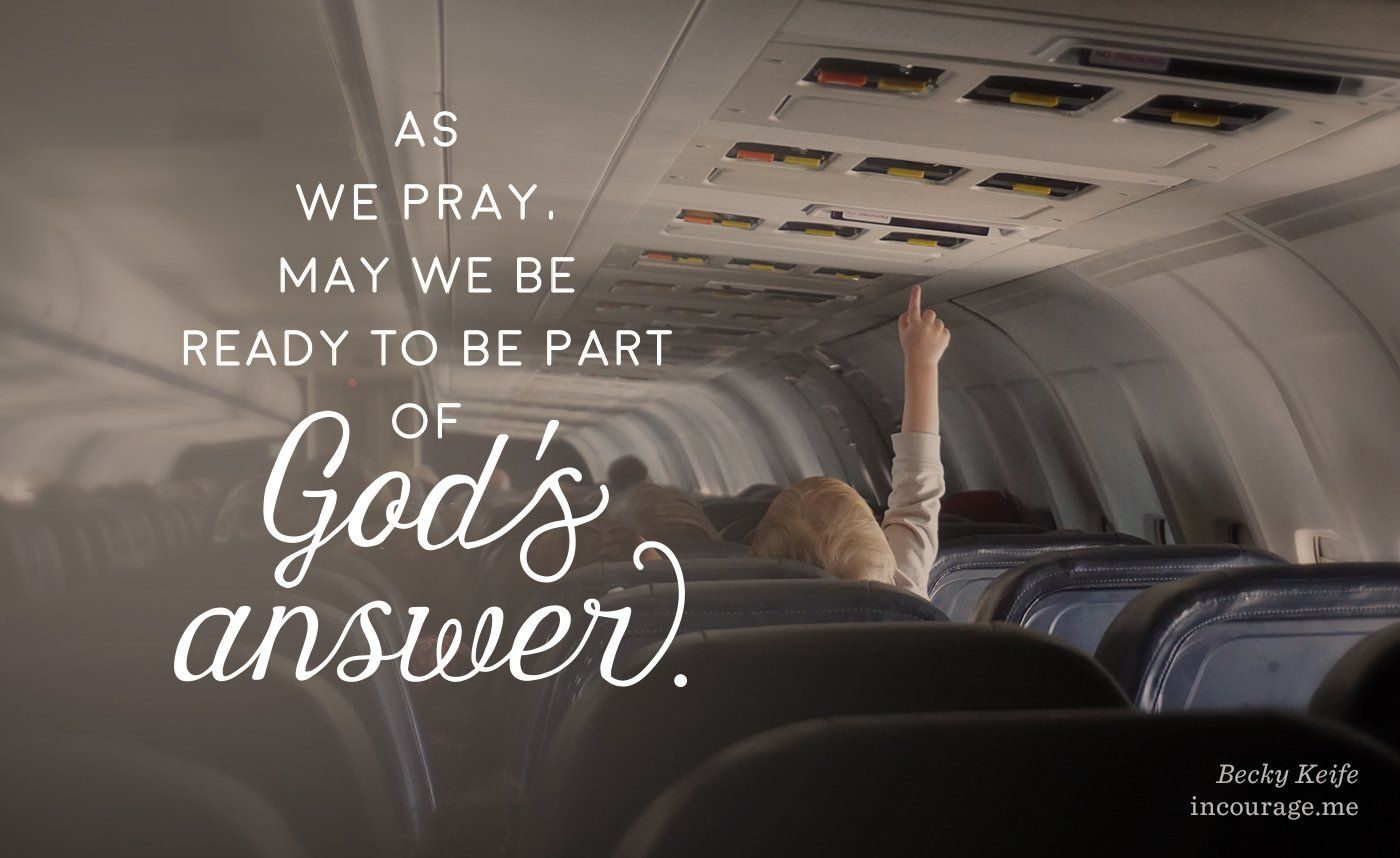
The smell of coffee beans and cinnamon rolls wafted through the crowded terminal. Passengers congregated like impatient sardines near the gate waiting for the airline employee to announce their boarding group. The flight was assigned seating so I was happy to wait till the last minute to start breathing recycled air. I was thrilled to be heading to the (in)courage retreat, but airplanes are not my favorite. At best, I feel squeezed and queasy; at worst, clear the aisle ‘cause I’m sprinting for the lavatory. I was already starting to feel anticipatory nausea (it’s a thing), and the loud shrieking nearby wasn’t helping. I looked over and saw a mom and toddler in front of a vending machine. The little boy stomped his feet until his mom handed him a blue bag of Chips Ahoy. Cookies at 9 am aren’t going to help anyone! I thought. Immediately, a pang of conviction trumped my judgment. Surely, I have not been above dolling out sugary snacks to buy myself a couple minutes of peace and quiet. Lord, forgive me for being quick to judge. Please bless this mama with someone kind and loving to sit next to on the plane. Help her to see You in her day. Amen. The traveling sardines eventually filed down the jetbridge. I followed to 17E. It was a full flight so I was surprised to find my entire row empty. As I shoved my backpack under the seat, I had a glorious vision: three hours of uninterrupted rest and productivity. With extra space, I’d be able to concentrate on finalizing my notes for the retreat and then catch a little snooze. I’d land ready and refreshed for all God had planned! I adjusted the air vent and closed the shutter. Deep breath. This might actually be a great flight. Then there they were. The little boy with chocolate chip crumbs on his chin crawling into the seat next to me. The mom settled in and took off her son’s shoes. He wiggled and shrieked and wedged himself on the floor between the seats. “I just want to apologize in advance,” she said. And I knew. I knew God was answering my prayer. Be the blessing. . . . . . Join me over at (in)courage today for the rest of the story and find out how an unexpected plane ride taught me how to pray!


